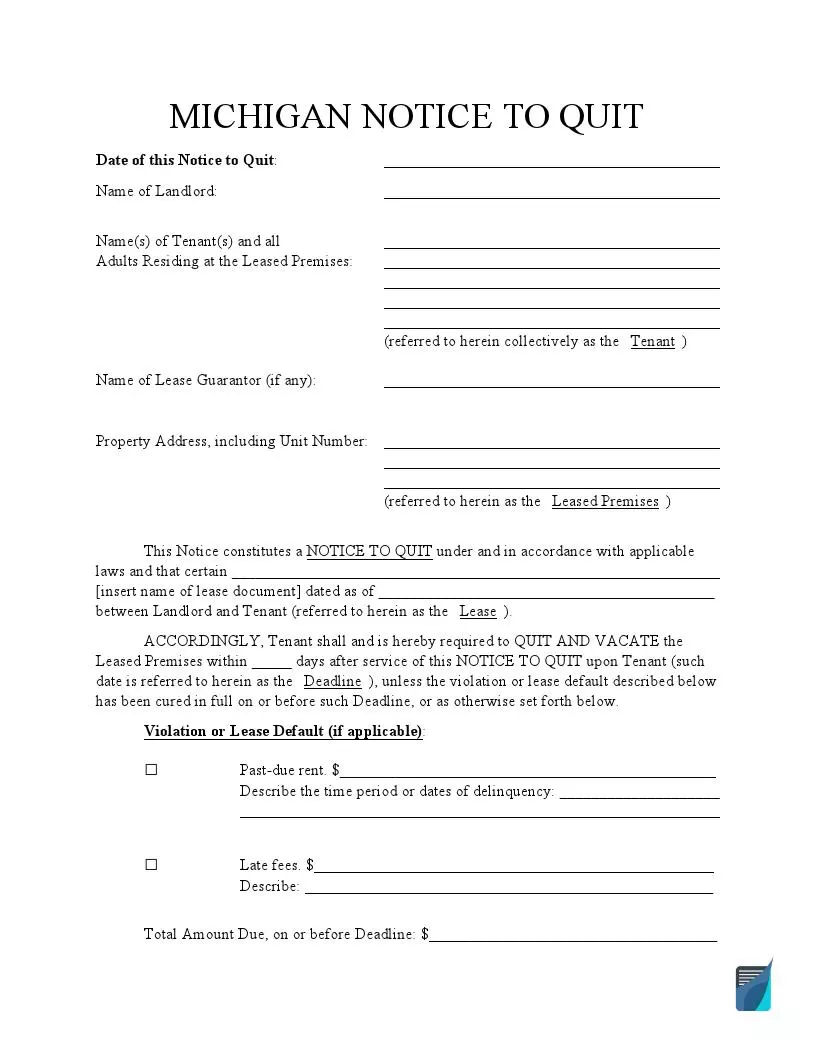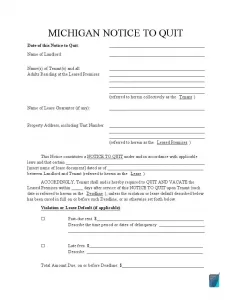Michigan Eviction Notice Forms
If someone who is renting out the premises and someone who is staying in the premises begin to debate, or a tenant violates the conditions of a rental contract, a landlord may wish to evict a tenant. Several steps and documents like an eviction notice are needed in the United States (including Michigan).
When looking for Michigan eviction notice templates, use our form building software to ensure successful form completion.
An eviction notice is a document that an owner of the leased place sends to a renter prior to going to court. There might be several reasons for a landlord’s desire for a tenant’s moving out: from delaying the rent payment to violating the rules of the contract. So, there are various types of the eviction notice template.
In this paper, you will usually see the names of a renter and an owner, the address of the leased property, the date when a renter should leave, and other items.

Build Your Document
Answer a few simple questions to make your document in minutes
Save and Print
Save progress and finish on any device, download and print anytime
Sign and Use
Your valid, lawyer-approved document is ready
Michigan Eviction Laws
If you are seeking information about the laws in Michigan that describe rules of eviction, you may appeal to section 554.134 of the Revised Statutes of 1846.
Also, Chapter 57 (Act 236, Revised Judicature Act of 1961) describes the process of applying to the court in Michigan when you need to evict someone from your property.
In Michigan, there are different periods for notifying a tenant about the eviction. They depend on what the tenant has done. For instance, if a tenant has delayed rent payment, a notice must be delivered in no less than seven days. In case of something illegal that a tenant conducts, a notice may arrive in 24 hours. Terms for other cases are prescribed in Section 554.134.
Michigan Eviction Notice Laws Details
| Rent Grace Period | Not specified |
| Notice of Non-Payment | 7 days |
| Notice of Non-Compliance | 7 days |
| State Laws | Michigan Compiled Laws, Sections 554.131 to 554.139 |
Eviction Notice Types Used in Michigan
In Michigan, an owner may choose from four typical forms if he or she wants to send such a notice. The templates are used for different purposes. So, you have to choose wisely before you begin the completion.
7-Day Notice to Quit (for Non-Payment)
This notice can help if a renter did not pay the rent in time.
30-Day Notice to Quit (for Month-to-Month Lease Agreements)
If an owner wants to terminate the lease agreement, such a form should be sent to a renter. Keep in mind that a renter has to receive it at least 30 days before the day of moving out.
24-Hour Notice to Quit (for Illegal Drug-Related Issues)
In case a tenant has conducted something illegal (for instance, related to drugs using or selling), an owner may notify him or her about leaving in 24 hours.
7-Day Notice to Quit (for Non-Compliance)
If a tenant has broken any condition of a lease agreement and a situation cannot improve, a landlord may send this kind of notice but in no less than seven days.

Eviction Process in Michigan
As an owner in Michigan, one day, you may need to initiate a process of eviction. We have developed a brief guide with steps you need to go through to evict a renter successfully.
- Notify a Renter
In the beginning, you should choose one of the forms of an eviction notice that would be the most relevant. Complete the document and give it to a renter.
- Go to Court
When you have sent a notice to a renter, he or she should react somehow: either improve the situation if it is possible or leave the leased property. In case you have not received any response, you may appeal to the court.
- Wait for the Renter’s Answer
After you have applied to the court, a renter will receive a notification. He or she will be able to respond and submit to the court one of the legal forms used in such cases.
- Complete the Eviction
There are cases when a renter does not react to notice or trial. If so, the court may decide that a landlord has won and the premises should be empty from a renter. Since the decision was made by the court, a renter has 10 days to leave. If this period has passed and nothing happened, a landlord may apply to the sheriff in his or her area.
Eviction Court Forms
Applying to the court in Michigan requires the completion and submission of various legal forms. Here is the list of such forms in this state:
- Application and Order of Eviction Form
This form is required for the completion of eviction if a tenant does not leave after the court has decided so. An owner should show this document to the sheriff. This application in Michigan is also referred to as the DC 107 Form.
- Answer for Health or Hazard to Property Form
If a renter was accused of ruining something in the property or there is a threat to health, he or she may complete this form to answer in the court. This template is officially named DC 111b.
- Summons Form
It is a document that a renter receives if an owner appeals to the court. This form is officially called DC 104 in Michigan.
- Answer for Non-Payment of Rent
For replying in the court about the payment delay, a renter has to submit this form. In Michigan, another name of the template of this form is DC 111a.
- Complaint Form
With this form, an owner starts the trial in the court. In Michigan, another name of this form’s template is DC 102c.
- Answer to Complaint to Recover Possession of Property Form
It is one of the forms that a renter should use to respond to accusations in court. This form is also known as DC 111c.

Check out our document maker to personalize any form on FormsPal to your requirements. Here’s a group of various other popular Michigan forms we provide.
Other Eviction Notice Forms by State
